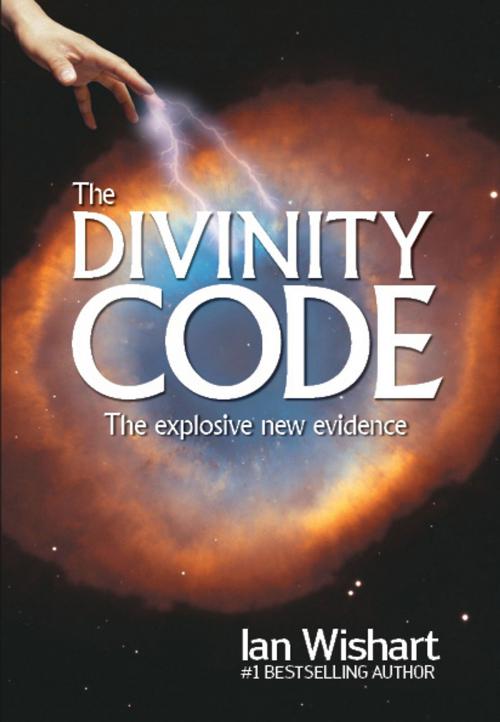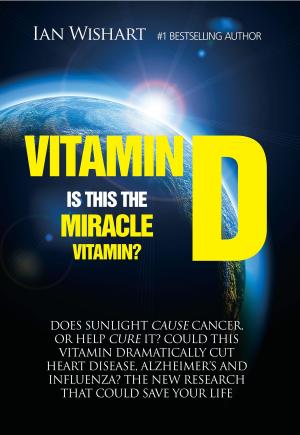The Divinity Code
The Explosive New Evidence
Nonfiction, Religion & Spirituality, Christianity, Evangelism, General Christianity, Bible & Bible Studies| Author: | Ian Wishart | ISBN: | 1230000098617 |
| Publisher: | Howling At The Moon Publishing Ltd | Publication: | January 12, 2013 |
| Imprint: | Language: | English |
| Author: | Ian Wishart |
| ISBN: | 1230000098617 |
| Publisher: | Howling At The Moon Publishing Ltd |
| Publication: | January 12, 2013 |
| Imprint: | |
| Language: | English |
This is not just another 'God' book. This is the definitive slap-down, slam-dunk, no-holds-barred prize title fight between the Divine and Richard Dawkins. Take a ringside seat as investigative journalist Ian Wishart presents the explosive scientific and historical evidence of a divinity code - an "inconvenient truth" that Dawkins and others have no credible explanation for, evidence that is turning both science and religion on their heads. Is there a rational explanation for the existence of the Universe, given the latest data? How did life arise? What about the evolution/intelligent design controversy? Aren't all religions equal? Did Jesus Christ even exist? Written in Wishart's acclaimed page-turner style, The Divinity Code is punchy, informative and easy to read... Watch as one of the country's hardest-hitting journalists turns his guns on a Zoologist (Dawkins), a Bishop (John Spong), a fellow journalist (Christopher Hitchens) and a former nun (Karen Armstrong), this is the ultimate shoot-out of the 'God' books...
WHAT OTHERS SAY
...In the Prologue, Wishart takes up the gauntlet laid down by Richard Dawkins in The God Delusion, and in fact, uses Dawkins own logic and methodology to launch a counter-attack against unbelief. The prologue closes with a question from Wishart Do I succeed? I struggled with the early chapters, which focus on the Biblical account of creation, and the counter arguments from evolutionists. Perhaps that was due to my perpetual struggles with things scientific; maybe it was due to the after-effects of a long flight however I persevered, and was glad that I did. One comment though Wishart s research is thorough, and his opinions are supported by facts. For me, The Divinity Code comes alive in chapter 9, The Myth of Christ. Over the next eight chapters, Wishart draws together a wealth of evidence supporting the life, death and resurrection of Jesus and in the process, makes a compelling case. And despite his disagreements with Dawkins, with Christopher Hitchens and with Lloyd Geering, Wishart reserves his strongest condemnation for Bishop John Shelby Spong. In chapter 14, Resurrection Fact or Fiction, Wishart hoists Spong by his own petard, pointing out the absurdity of the Bishop s claims about the central nugget of Christianity . Having started with a Prologue, Wishart fittingly ends with an Epilogue where he states: I m not here to force anyone to convert..........Rather, my aim has been merely to argue the case for faith the sole task of this book has been to document the hard evidence that actually does exist in favour of the God Hypothesis So, to return to Wishart s question Do I succeed? In my case, he was preaching to the converted, so the answer is irrelevant. Read The Divinity Code for yourself, with an open mind. You ll find it challenging and thought-provoking, and Ian Wishart makes a compelling case against unbelief. --KeepingStock.blogspot
I m having a cracking good read of another cracking good read - The Divinity Code by Ian Wishart, his follow-up book to Eve s Bite which was also a cracking good read. I don t know Wishart s following, other than that he is a Christian and came to Faith from atheism a number of years ago. The Divinity Code is one of the best *Christian* apologetic books I have read. There are a few small details that I think shows that he is not Catholic, but it is an excellent book nevertheless. Don t miss reading it if you can. --"NZ Catholic" newspaper's blog, "Being Frank"
--KeepingStock
New Zealand journalist Ian Wishart became a Christian after an enthusiastic atheistic stance during which he took part in interventions with Christians to try and turn them from the faith. According to his introduction in his latest book the Divinity code (home, Amazon page), the Lord converted him to Christianity, regardless of his belief in how the world came to be, and now, years down the track he has written a very compelling response to books such as "The God Delusion" by Richard Dawkins. In the book Wishart explores a variety of protests to the existence of God and the authenticity of the Bible, and pulls apart the latest round of atheistic posturing and in the process demonstrates that Christianity stands up to scientific and historical evidence extremely well when it is looked at through an unbiased lense. The concepts that Wishart points to in the first few chapters, which deal with the origin of the world have mostly been overlooked by the atheist community. You can read about these in books such as "The Privileged planet" (also available on DVD in abridged form and posted online here). However, Wishart in his book goes much further than just to look at science. He compares the story of Genesis with the stories of many other ancient cultures and stories, as well as dealing with the unique claims from the Bible about God, Christ and even the Bible itself. He does this in some depth drawing on writings dating back to first century historians (in the case of the New Testament account of Christ). As he does this, he takes the "inaccuracies" of Dawkins, Hitchens, Harris, Spong and others and pulls them apart, looking deep into the facts and issues around them and explaining with clarity the real story that is behind them. The second half of the book deals much more specifically with the Biblical claims (the existence of Christ, His resurrection, miracles and prophecy are all included). Wishart explores the attacks on scripture from recent books and rantings and then proceeds to demonstrate the shortfalls of the opposing arguments and demonstrate clearly from neutral sources that their scholarship simply falls short. If you are someone who is wondering about all the arguments that have been offered and whether Christianity makes any sense at all, this book is remarkably cohesive, presenting clearly that not only do the latest atheistic arguments fall short in a number of ways, but that by starting your world view with the Bible, the world is intelligible and even somewhat predictable. Personally, I enjoyed this book. Ian writes in an easy to understand manner, and while his tone may offend those who he opposes on occasion, (not that they are likely to read the book anyway), his style is engaging and keeps you reading to the end. Unless you are a hard core apologist who who is reading the deeper science and history books yourself, I recommend this book wholeheartedly. - The Bible Geek --The Bible Geek --The Bible Geek
The title of the book is obviously a riposte to the popular and untrustworthy novel The Da Vinci Code . That book was an attack on orthodox Christianity in the form of a novel. It belongs to a whole series of recent books denigrating Christianity.
These books, as Pope Benedict XVI remarked, attack the Christian vision which supplanted that of the pagan world. The world view of that time, which in a different way has become fashionable again today. It is not the elemental spirits of the universe, the laws of matter, which ultimately govern the world and mankind, but a personal God governs the stars, that is, the universe; it is not the laws of matter and of evolution that have the final say, but reason, will, love, i.e. a Person. [Spe Salvi, par.5]
This book is an outright refutation of these modern views, propounded not only by novelists, but by scientists, philosophers and historians. I find this fashionable rash of heresies interesting because they illustrate two fundamental weaknesses of humanity. One weakness is that of hubris , well documented by the ancient Greeks, is the arrogance of a creature, a mammal, that believes he can be as independent as a god. Adam and Eve are the progenitors of this. The second is the inability of human reason to account for all the facts in a discussion on ultimate questions.
The Greeks again refused to accept statements that did not cover all the appearances . Thomas Huxley put his finger on this when he wrote, The great tragedy of science is the slaying of a beautiful hypothesis by an ugly fact. It is inability to face the ugly fact that vitiates all these attacks on Christianity.
The genius of this Kiwi author is the ability to discover those ugly facts that slay the hypotheses of scientists, philosophers, historians and novelists that God does not exist and that Jesus Christ was not a person in history but a myth. Its coverage is almost encylopedic. Wishart s skill as an investigative journalist is obvious as he takes hypothesis after hypothesis and demonstrates their inadequacy because the do not preserve all the appearances. He also has a sense of humour that lightens the concentration, such as this quotation from a Chinese palaeontologist: In China we can criticise Darwin but not the government; in America you can criticise the government but not Darwin. How true!
This is a readable, but not simple book that confronts the ultimates that face human destiny. It is, therefore, worth studying despite what seems an occasional overkill.
Bishop Mackey is Bishop Emeritus of Auckland. --NZ Catholic, Feb 2008 edition
This is a "must read" book for everyone. Well, that is an over-used phrase, I know... but what makes a book really "must read" quality, or even a "good read"? Often, sadly, it is a mixture of the author agreeing with the reviewer's ideas, or because it makes difficult issues easy to understand by sacraficing accuracy, or it has a polished writing style that deflects the eye from the quality of the argument. "The Divinity Code" wins in every way that really matters, and is likely to be both a helpful first read for some people on the most important questions of life, and a work that "raises the bar" for the opposition writers to try to match.
As the book's name may imply, this is a response to several popular modern books that either aim to debunk Christianity or cash-in on concepts of secret codes and so on. Ian Wishart debunks the debunkers, with style and humour - and the obvious confidence of a researcher who has done a lot more homework than those he discredits. The main authors in his sights are Richard Dawkins, John Spong, Christopher Hitchens, and Karen Armstrong. He packs the 300-odd pages with many facts, mostly much better referenced and more logically assembled than I have come to expect from many of the authors he argues against.
The book is promoted as: "This is not just another 'God' book. This is the definitive slap-down, slam-dunk, no-holds-barred prize title-fight between the Divine and Richard Dawkins." It is pretty definitive in places, and always valuable for prompting further thought, but I would have to say it's not even just another slam-dunk book either... sure, there are some explosive punches from about page 115 onwards, with the author arguing strongly, convincingly, seemingly comfortably within his element in not just scotching notions and wild claims from his opponents - but able to bring it all into an overarching coherent view of God and Scripture at the same time. It also tackles some of the big moral and spiritual issues in life; the book dares to ask those deep questions where science does not go. So he answers evidence with better evidence, which is good in itself, but he doesn't stop there. This makes the book more valuable than many of those who simply dispute, point-by-point, with atheists. I would recommend this book over, say, "God and the new atheism : a critical response to Dawkins, Harris, and Hitchens" by John F. Haught.
The author says he follows the scientific evidence where it leads, not just where we want it to lead. This is not an "anti science" book, nor even an "anti scientist" one, although scientists and others that mess up in their claims take an appropriate amount of pounding (and Spong probably gets the most criticism for misunderstanding or misleading). Sometimes fundamentalist atheists and fundamentalist Christians simply feed on each other, or at least appear to be opposite sides of the same coin. This book is somewhat different; the author is not afraid to say we cannot be certain about some things (such as the tense of a Hebrew word which would prove whether he or Spong is right). It often, but not always, indicates the degree to which a theory is generally held (you may have expected people wading into such debates to impress upon the reader that everything they say is undeniably certain).
The book covers a lot of ground quickly, yet it is never a difficult read. Some of the explanations relating to understanding Hebrew text may be too easy for some, but rarely is anything too difficult that is essential to the point being made. Some phrases, such as "cosmological constant" are dropped in without explanation, yet understanding them is optional. Where I might complain would be the places where some issues are raised with sweeping statements in those question-asking sections of the book that are obviously there to be though-provoking. Either an extreme need for brevity, or a bias, or a lack of understanding on the part of the author, may have led to paragraphs that could easily give the wrong impression if the reader were to imagine the book is delivering a final and sufficient answer on these matters, rather than providing a stimulus for further reading.
Overall: very well worth reading, for anyone within the "God" debate, or onlookers of just about any age and background that enjoy the stimulus of serious questioning. - M S Aitchison
This is not just another 'God' book. This is the definitive slap-down, slam-dunk, no-holds-barred prize title fight between the Divine and Richard Dawkins. Take a ringside seat as investigative journalist Ian Wishart presents the explosive scientific and historical evidence of a divinity code - an "inconvenient truth" that Dawkins and others have no credible explanation for, evidence that is turning both science and religion on their heads. Is there a rational explanation for the existence of the Universe, given the latest data? How did life arise? What about the evolution/intelligent design controversy? Aren't all religions equal? Did Jesus Christ even exist? Written in Wishart's acclaimed page-turner style, The Divinity Code is punchy, informative and easy to read... Watch as one of the country's hardest-hitting journalists turns his guns on a Zoologist (Dawkins), a Bishop (John Spong), a fellow journalist (Christopher Hitchens) and a former nun (Karen Armstrong), this is the ultimate shoot-out of the 'God' books...
WHAT OTHERS SAY
...In the Prologue, Wishart takes up the gauntlet laid down by Richard Dawkins in The God Delusion, and in fact, uses Dawkins own logic and methodology to launch a counter-attack against unbelief. The prologue closes with a question from Wishart Do I succeed? I struggled with the early chapters, which focus on the Biblical account of creation, and the counter arguments from evolutionists. Perhaps that was due to my perpetual struggles with things scientific; maybe it was due to the after-effects of a long flight however I persevered, and was glad that I did. One comment though Wishart s research is thorough, and his opinions are supported by facts. For me, The Divinity Code comes alive in chapter 9, The Myth of Christ. Over the next eight chapters, Wishart draws together a wealth of evidence supporting the life, death and resurrection of Jesus and in the process, makes a compelling case. And despite his disagreements with Dawkins, with Christopher Hitchens and with Lloyd Geering, Wishart reserves his strongest condemnation for Bishop John Shelby Spong. In chapter 14, Resurrection Fact or Fiction, Wishart hoists Spong by his own petard, pointing out the absurdity of the Bishop s claims about the central nugget of Christianity . Having started with a Prologue, Wishart fittingly ends with an Epilogue where he states: I m not here to force anyone to convert..........Rather, my aim has been merely to argue the case for faith the sole task of this book has been to document the hard evidence that actually does exist in favour of the God Hypothesis So, to return to Wishart s question Do I succeed? In my case, he was preaching to the converted, so the answer is irrelevant. Read The Divinity Code for yourself, with an open mind. You ll find it challenging and thought-provoking, and Ian Wishart makes a compelling case against unbelief. --KeepingStock.blogspot
I m having a cracking good read of another cracking good read - The Divinity Code by Ian Wishart, his follow-up book to Eve s Bite which was also a cracking good read. I don t know Wishart s following, other than that he is a Christian and came to Faith from atheism a number of years ago. The Divinity Code is one of the best *Christian* apologetic books I have read. There are a few small details that I think shows that he is not Catholic, but it is an excellent book nevertheless. Don t miss reading it if you can. --"NZ Catholic" newspaper's blog, "Being Frank"
--KeepingStock
New Zealand journalist Ian Wishart became a Christian after an enthusiastic atheistic stance during which he took part in interventions with Christians to try and turn them from the faith. According to his introduction in his latest book the Divinity code (home, Amazon page), the Lord converted him to Christianity, regardless of his belief in how the world came to be, and now, years down the track he has written a very compelling response to books such as "The God Delusion" by Richard Dawkins. In the book Wishart explores a variety of protests to the existence of God and the authenticity of the Bible, and pulls apart the latest round of atheistic posturing and in the process demonstrates that Christianity stands up to scientific and historical evidence extremely well when it is looked at through an unbiased lense. The concepts that Wishart points to in the first few chapters, which deal with the origin of the world have mostly been overlooked by the atheist community. You can read about these in books such as "The Privileged planet" (also available on DVD in abridged form and posted online here). However, Wishart in his book goes much further than just to look at science. He compares the story of Genesis with the stories of many other ancient cultures and stories, as well as dealing with the unique claims from the Bible about God, Christ and even the Bible itself. He does this in some depth drawing on writings dating back to first century historians (in the case of the New Testament account of Christ). As he does this, he takes the "inaccuracies" of Dawkins, Hitchens, Harris, Spong and others and pulls them apart, looking deep into the facts and issues around them and explaining with clarity the real story that is behind them. The second half of the book deals much more specifically with the Biblical claims (the existence of Christ, His resurrection, miracles and prophecy are all included). Wishart explores the attacks on scripture from recent books and rantings and then proceeds to demonstrate the shortfalls of the opposing arguments and demonstrate clearly from neutral sources that their scholarship simply falls short. If you are someone who is wondering about all the arguments that have been offered and whether Christianity makes any sense at all, this book is remarkably cohesive, presenting clearly that not only do the latest atheistic arguments fall short in a number of ways, but that by starting your world view with the Bible, the world is intelligible and even somewhat predictable. Personally, I enjoyed this book. Ian writes in an easy to understand manner, and while his tone may offend those who he opposes on occasion, (not that they are likely to read the book anyway), his style is engaging and keeps you reading to the end. Unless you are a hard core apologist who who is reading the deeper science and history books yourself, I recommend this book wholeheartedly. - The Bible Geek --The Bible Geek --The Bible Geek
The title of the book is obviously a riposte to the popular and untrustworthy novel The Da Vinci Code . That book was an attack on orthodox Christianity in the form of a novel. It belongs to a whole series of recent books denigrating Christianity.
These books, as Pope Benedict XVI remarked, attack the Christian vision which supplanted that of the pagan world. The world view of that time, which in a different way has become fashionable again today. It is not the elemental spirits of the universe, the laws of matter, which ultimately govern the world and mankind, but a personal God governs the stars, that is, the universe; it is not the laws of matter and of evolution that have the final say, but reason, will, love, i.e. a Person. [Spe Salvi, par.5]
This book is an outright refutation of these modern views, propounded not only by novelists, but by scientists, philosophers and historians. I find this fashionable rash of heresies interesting because they illustrate two fundamental weaknesses of humanity. One weakness is that of hubris , well documented by the ancient Greeks, is the arrogance of a creature, a mammal, that believes he can be as independent as a god. Adam and Eve are the progenitors of this. The second is the inability of human reason to account for all the facts in a discussion on ultimate questions.
The Greeks again refused to accept statements that did not cover all the appearances . Thomas Huxley put his finger on this when he wrote, The great tragedy of science is the slaying of a beautiful hypothesis by an ugly fact. It is inability to face the ugly fact that vitiates all these attacks on Christianity.
The genius of this Kiwi author is the ability to discover those ugly facts that slay the hypotheses of scientists, philosophers, historians and novelists that God does not exist and that Jesus Christ was not a person in history but a myth. Its coverage is almost encylopedic. Wishart s skill as an investigative journalist is obvious as he takes hypothesis after hypothesis and demonstrates their inadequacy because the do not preserve all the appearances. He also has a sense of humour that lightens the concentration, such as this quotation from a Chinese palaeontologist: In China we can criticise Darwin but not the government; in America you can criticise the government but not Darwin. How true!
This is a readable, but not simple book that confronts the ultimates that face human destiny. It is, therefore, worth studying despite what seems an occasional overkill.
Bishop Mackey is Bishop Emeritus of Auckland. --NZ Catholic, Feb 2008 edition
This is a "must read" book for everyone. Well, that is an over-used phrase, I know... but what makes a book really "must read" quality, or even a "good read"? Often, sadly, it is a mixture of the author agreeing with the reviewer's ideas, or because it makes difficult issues easy to understand by sacraficing accuracy, or it has a polished writing style that deflects the eye from the quality of the argument. "The Divinity Code" wins in every way that really matters, and is likely to be both a helpful first read for some people on the most important questions of life, and a work that "raises the bar" for the opposition writers to try to match.
As the book's name may imply, this is a response to several popular modern books that either aim to debunk Christianity or cash-in on concepts of secret codes and so on. Ian Wishart debunks the debunkers, with style and humour - and the obvious confidence of a researcher who has done a lot more homework than those he discredits. The main authors in his sights are Richard Dawkins, John Spong, Christopher Hitchens, and Karen Armstrong. He packs the 300-odd pages with many facts, mostly much better referenced and more logically assembled than I have come to expect from many of the authors he argues against.
The book is promoted as: "This is not just another 'God' book. This is the definitive slap-down, slam-dunk, no-holds-barred prize title-fight between the Divine and Richard Dawkins." It is pretty definitive in places, and always valuable for prompting further thought, but I would have to say it's not even just another slam-dunk book either... sure, there are some explosive punches from about page 115 onwards, with the author arguing strongly, convincingly, seemingly comfortably within his element in not just scotching notions and wild claims from his opponents - but able to bring it all into an overarching coherent view of God and Scripture at the same time. It also tackles some of the big moral and spiritual issues in life; the book dares to ask those deep questions where science does not go. So he answers evidence with better evidence, which is good in itself, but he doesn't stop there. This makes the book more valuable than many of those who simply dispute, point-by-point, with atheists. I would recommend this book over, say, "God and the new atheism : a critical response to Dawkins, Harris, and Hitchens" by John F. Haught.
The author says he follows the scientific evidence where it leads, not just where we want it to lead. This is not an "anti science" book, nor even an "anti scientist" one, although scientists and others that mess up in their claims take an appropriate amount of pounding (and Spong probably gets the most criticism for misunderstanding or misleading). Sometimes fundamentalist atheists and fundamentalist Christians simply feed on each other, or at least appear to be opposite sides of the same coin. This book is somewhat different; the author is not afraid to say we cannot be certain about some things (such as the tense of a Hebrew word which would prove whether he or Spong is right). It often, but not always, indicates the degree to which a theory is generally held (you may have expected people wading into such debates to impress upon the reader that everything they say is undeniably certain).
The book covers a lot of ground quickly, yet it is never a difficult read. Some of the explanations relating to understanding Hebrew text may be too easy for some, but rarely is anything too difficult that is essential to the point being made. Some phrases, such as "cosmological constant" are dropped in without explanation, yet understanding them is optional. Where I might complain would be the places where some issues are raised with sweeping statements in those question-asking sections of the book that are obviously there to be though-provoking. Either an extreme need for brevity, or a bias, or a lack of understanding on the part of the author, may have led to paragraphs that could easily give the wrong impression if the reader were to imagine the book is delivering a final and sufficient answer on these matters, rather than providing a stimulus for further reading.
Overall: very well worth reading, for anyone within the "God" debate, or onlookers of just about any age and background that enjoy the stimulus of serious questioning. - M S Aitchison















